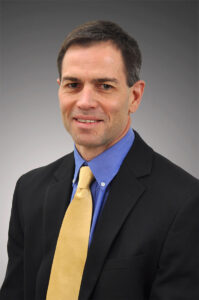Professor
Email: BowlesD@missouri.edu

RESEARCH INTERESTS
Dr. Bowles focuses his research on the effects of exercise training on the heart and coronary arteries. The goal of Dr. Bowles’ research is to determine the molecular mechanisms underlying the contribution of vascular smooth muscle (VSM) in the development of atherosclerotic plaque and the mechanisms by which plaque composition may be altered. The lab’s approach is vertically integrated, progressing from molecular mechanisms of gene expression, to murine transgenic models to clinical measures of CAD in swine models of atherosclerosis. This approach spans in vitro knockdown/overexpression to cell electrophysiology to catheter-based coronary intervention involving coronary angiography, intravascular ultrasound (IVUS) and vascular gene therapy (i.e. molecular silencing/overexpression). To enhance translational application, the lab has become “swine interventional cardiologists”. This has allowed lab members to apply human CAD assessment approaches, e.g. IVUS and quantitative angiography in the swine, to pursue the mechanistic bases in a model of true CAD. The lab also uses mouse transgenic models of atherosclerosis to determine candidate gene causality.
SELECTED PUBLICATIONS
Bowles, D.K., M.H. Laughlin and M. Sturek. Exercise training increases L-type calcium current density in coronary smooth muscle. Am. J. Physiol. (Heart Circ. Physiol. 44):H2159-H2169, 1998.
Bowles, DK. Adaptation of ion channels in the microcirculation to exercise training. Microcirc 7:25-40, 2000.
Wamhoff, B, NJ Dietz, DK Bowles and M Sturek. Exercise training attenuates coronary smooth muscle phenotypic modulation and nuclear Ca2+ signaling. Am J Physiol Heart Circ Physiol 283: H2397-H2410, 2002.
Bowles, D.K., C.L. Heaps, J. Turk, K.K. Maddali and E. M. Price. Hypercholesterolemia inhibits L-type calcium current in coronary macro, not microcirculation. J. Appl. Physiol. 96: 2240-2248, 2004.
Bowles, D.K., V.K. Ganjam, K.K. Maddali, L.J. Rubin, D.L. Tharp, J.R. Turk and C.L. Heaps. Endogenous testosterone increases L-type Ca2+ channel expression in porcine coronary smooth muscle. Am. J. Physiol. (Heart Circ. Physiol). 287: H2091-H2098, 2004.
Heaps, C.L., D.L. Tharp and D.K. Bowles. Hypercholesterolemia abolishes voltage-dependent K+ channel contribution to adenosine-mediated relaxation in porcine coronary arterioles. Am. J. Physiol. (Heart Circ. Physiol). In press: 10.1152/ajpheart.00157.2004.